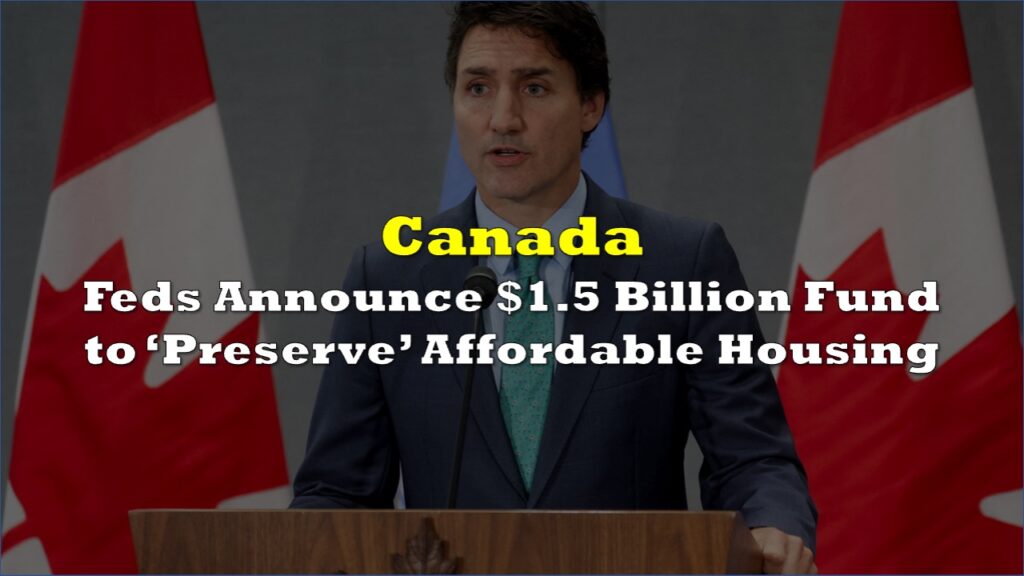Prime Minister Justin Trudeau recently unveiled plans for a groundbreaking “Canadian Renters’ Bill of Rights” during an announcement in Vancouver on Wednesday.
The proposed bill encompasses several key provisions supposedly designed to empower renters and enhance transparency in the rental market. Among its highlights are mandates requiring landlords to disclose rental price histories of their properties to prospective tenants.
Furthermore, Trudeau emphasized the inclusion of legal funding to support tenants in combating unfair practices from landlords like unjust rent increases, renovictions, and problematic landlord behavior.
“In today’s Canada, more people are renting than ever before … Nearly two thirds of young Canadians rent their homes,” he said. “Maybe young people want to start a family, but they don’t know how they can afford something bigger than a one-bedroom apartment.”
BREAKING: During an announcement in Vancouver. Prime Minister Trudeau announces a new Renters Bill of Rights which includes protections for tenants, legal funding to fight unfair practices from landlords, and your rent will now count towards your credit score/profile. pic.twitter.com/fFIR7fjKem
— JB | Polisci (@cdnpoli101) March 27, 2024
The announcement comes against the backdrop of mounting concerns over housing affordability and rental market dynamics across Canada. Data from the Canada Mortgage and Housing Corp. (CMHC) underscores the persistent imbalance between rental demand and supply, with rental costs escalating in many urban centers.
Mississauga-Malton MP Iqwinder Gaheer also added that there would be a $15 million “tenant protection fund” that would provide funding to provincial legal aid organizations.
We’re creating a Canadian Renters’ Bill of Rights to ensure transparency and fairness in rent pricing.
— Iqwinder S. Gaheer (@IqwinderSGaheer) March 27, 2024
We’ll also launch a tenant protection fund and ensure renters build their credit through on-time rent payments. pic.twitter.com/iYxHMVYgRO
However, the implementation of the proposed Renters’ Bill of Rights may face hurdles, as it requires cooperation and buy-in from provincial governments. Cedric Dussault, a tenants’ advocate with the Quebec-based organization RCLALQ, expressed skepticism about the federal government’s jurisdiction in enacting such legislation.
“To be frank, we’re not sure this is really up to the federal government to enact,” he said in an interview, calling the announcement “surprising.”
Did he consult with the provinces and territories before rolling this out?
— Melissa Mbarki (@MelissaMbarki) March 27, 2024
"The Canadian Renters’ Bill of Rights would also need partnerships with provinces and territories to require landlords to disclose a history of unit pricing and create a national standard for lease… https://t.co/aeC3Sr3xPe
Kirk Lubimov, offering commentary on the announcement, criticized the Liberal government’s approach, characterizing the bill as favoring corporations and entities perceived as “bad actors.”
“There is nothing in it that will provide protection for homeowners which will end up reducing investments in RE, except for the big corps which the Trudeau gov subsidizing, and adds more risk,” he asserted.
Central to Lubimov’s critique is the notion that the proposed bill fails to address the underlying causes of rising rental costs, particularly in the context of inflation and housing unaffordability.
“What is unfair rising rent payments?” he added. “The market decides that. How will the Liberals dictate what is ‘fair’ after causing the inflation and unaffordability we are seeing in housing.”
Furthermore, Lubimov raised doubts about the concept of granting renters more “agency” in rental properties owned by others. He questioned the feasibility and fairness of empowering renters within the confines of someone else’s property, suggesting potential conflicts between tenant rights and property ownership.
The Liberals are taking another swing at home ownership with a Bill that will favour corporations and bad actors with the Canadian Renters' Bill of Rights.
— Kirk Lubimov (@KirkLubimov) March 27, 2024
There is nothing in it that will provide protection for homeowners which will end up reducing investments in RE, except for… pic.twitter.com/mAONVtc1Xa
Credit score
However, in a move with potential long-term implications for renters’ financial well-being, Trudeau also revealed that rental payments would now factor into individuals’ credit scores/profiles. This development marks a significant departure from conventional credit assessment methods, potentially opening doors for renters to build credit through timely rent payments.
The proposal includes amending the Canadian Mortgage Charter, urging banks and credit companies to integrate rental payments into Canadians’ credit histories.
Trudeau emphasized the significance of this measure during a press release, highlighting the disparity between homeowners and renters in building credit. Trudeau lamented the fact that while property owners can bolster their credit scores through mortgage payments, renters receive no recognition for their monthly rental expenditures.
“Currently, you’re spending $2,000 a month on rent. That gives you no kudos. It gives you no credit,” Trudeau remarked, underscoring the need for reform in recognizing the financial responsibility demonstrated by renters.
Deputy Prime Minister and Finance Minister Chrystia Freeland previously announced that the 2024 federal budget is scheduled for presentation on Tuesday, April 16. Addressing concerns over inflation and the impending mortgage renewals faced by many Canadians, Freeland signaled a budgetary focus on housing affordability and job creation, while maintaining fiscal prudence to limit major new spending initiatives.
Reactions to this particular measure are varied, with critics saying that recognizing rental payments in credit scores may be detrimental for renters facing hurdles in payments.
“Wow, Trudeau proposing to include rent payments in credit scores. This would be awesome, fantastic news for landlords. Crushing for deadbeat tenants,” said X user @conorsvan1.
Some observers, like Dieter MacPherson, expresse positive reception to the concept of The Renters Bill of Rights but also advocate for the “reform of the credit score system.”
Wow, Trudeau proposing to include rent payments in credit scores. This would be awesome, fantastic news for landlords. Crushing for deadbeat tenants.
— Conor in BC (@conorsvan1) March 27, 2024
Good luck bargaining based on prior rent for the units though, Landlord won't care, its market rate that counts. pic.twitter.com/GcwBCxjvWK
Credit scores only became a thing in Canada in 1989( and wide spread in the mid 90s). I like the concept of The Renters Bill of Rights, but I also strongly believe we need reform of the credit score system in parallel.
— Dieter MacPherson 🚀🌔 (@dmacpher) March 27, 2024
Currently, payment history is one of the most significant factors influencing credit scores. Consistently making on-time payments for credit cards, loans, mortgages, and other debts positively impacts credit scores. Conversely, late payments, defaults, or accounts sent to collections can have a detrimental effect.
The credit score system in Canada, however, faces several criticisms, including concerns about limited data accuracy and inclusion, lack of transparency in scoring algorithms, inflexibility in assessing creditworthiness, and the perpetuation of socioeconomic disparities. Criticisms also extend to the system’s impact on financial opportunities, as individuals with poor credit histories may encounter challenges in accessing favorable terms for financial products.
Information for this briefing was found via CTV News and the sources mentioned. The author has no securities or affiliations related to this organization. Not a recommendation to buy or sell. Always do additional research and consult a professional before purchasing a security. The author holds no licenses.











